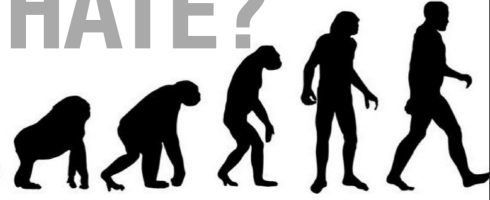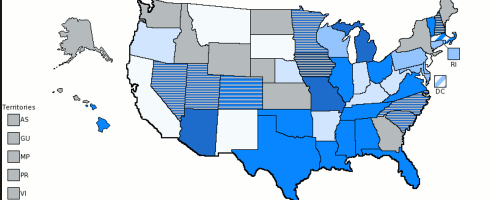Why do some people hate Barack Obama? Is it because he’s black?
24 Feb
A Better Primary System
3 Feb
- Let Iowa and New Hampshire continue holding nominating contests in early February.
- Then, sort all remaining states (and voting territories, like Guam) by size, and classify them into three tiers, with an approximately equal number of delegates at stake in each tier.
- All states in the first tier (the smallest states) vote on the second Tuesday in February.
- Tier two votes on the second Tuesday in March.
- Tier three votes on the second Tuesday in April. And then you can hold the conventions in May.
- Tiers 1 and 3 rotate places every four years.
WHY SHOULD WE ADOPT THIS SYSTEM?
The current primary system is a mess.
Almost every state is faced with a dilemma: 1) leave the primary where it is and resign oneself to a state of irrelevance, or 2) move the primary inexorably earlier, wasting millions, or even hundreds of millions of dollars (as in the case of California in 2008) just in the transaction costs of hosting Presidential primaries separately from local primaries. The alternative (moving all of the local primaries earlier and earlier every year) is likewise sub-optimally palatable.
The public are forced to coexist with an inexorably lengthening election cycle, in which national elections have become a near-constant phenomenon.
Those few states that take a moral stand and refuse to move their primary to gain influence are punished for it.
Finally, the primary system is lumpy. Some states’ primaries are all alone amidst a sea of media coverage. Others’ are all clogged into Super Tuesday.
It is, quite simply, a senseless mess. And, everyone knows it.
If everyone knows and agrees that it is a mess, then why hasn’t anyone changed it?
That’s a great question. One might similarly ask why Congress never seems to get around to passing budget bills until the government is brought to the brink of collapse. The simple answer is that a complex system with many stakeholders contains a lot of obstacles to doing things. Few states have a strong interest in reforming the primary system. But, the traditional first few states have a very large interest in retaining their primacy.
Plus, not everyone has coalesced around the same solution yet. A lot of people would like the states to all be equal. Iowa and New Hampshire want to retain their primacy. Some people think that the race fundamentally changes once the first couple of actual votes are cast and recorded, and so it is a good idea to put a couple of states without a ton of delegates a bit ahead of everyone else, so that the system has a chance to adjust to whatever happens and really vet the candidates. Some people want a drawn out primary, so that the candidates are more thoroughly vetted. Other people advocate a shorter primary, so that the eventual winner is less damaged by the time they go up against the opposition.
This system gets around those concerns.
By retaining Iowa and New Hampshire as the first states, this plan simultaneously avoids pissing off those states and retains the advantages of having a couple of states out front for early vetting. The inhabitants of both states are actually quite used to performing this job, and take cultural pride in it. Anyways, they really only have a few delegates between them, so it doesn’t make that much difference to everyone else.
Then, this system puts all of the other states on equal footing with eachother. Under this system, there are no states that are truly irrelevant, as there is a substantial possibility that any given competitive election will still be undecided by the time it gets to the third wave.
In the current system, campaign events are heavily concentrated in the first 4 states, and almost non-existent for states whose contests occur after Super Tuesday. This system would allow candidates to focus their efforts in states that are conducive to their message. All states would see campaign events.
By the same token, we should do away with the electoral college, and enter an era of true representative democracy.
Suspension of Political Coverage; Adam Lambert Earns New Peak on the Hot 100
15 SepI will be suspending coverage of politics and political issues on this blog effective immediately in order to avoid the appearance of impropriety. I have recently been appointed and sworn in to the high post of Intern for a Federal Judge. Literally, I was sworn in. So now, I have an oath to uphold the Constitution and a duty to keep my lips sealed. I pretty much have no opinions on anything in writing until December.
For now, everyone enjoy the Wednesday Republican debate, where Carly Fiorina is scheduled to attempt a take-down of Donald Trump after he said something unkind about her face. If nothing else, it should at least be better than most other reality television shows.
In other news, in its lucky thirteenth week, Adam Lambert’s new single “Ghost Town” gains eight slots and reaches a new peak on the Billboard Hot 100. Do you think it’s a fluke, or is this song a hit? Have a listen here and share your thoughts in the comments below.
Rick Perry Drops out of the Presidential Race
11 SepPer the Washington Post, Texas Governor Rick Perry has suspended his campaign, effectively ending his second run at the Whitehouse. Realclearpolitics.com’s polling average has Perry in 13th place, with an average of 0.8% of the vote. In the most recent poll, from CNN/ORC, Perry came in last with only 0% of the vote after rounding.
Rick Perry enjoyed a brief moment in the sun as the Republican frontrunner during the month of September the year before the 2012 Presidential election.
The #1 Way Donald Trump is Helping Hillary Clinton
18 Aug
There are a lot of ways that The Donald is helping The Hillary in her quest to become the first female POTUS. For starters, he makes the GOP look pretty gawdawful to low information moderate and democratic voters who see only “current Republican frontrunner” coupled with “lots of crazy positions and offensive comments.” But, the thing about low information voters is that they don’t pay very much attention to politics, or the news in general. Consequently, they tend to have short memories, and they are ultimately unlikely to punish Jeb Bush or Scott Walker on election day for what Donald Trump said more than a year earlier. No, The Donald does something far worse for the GOP’s electoral prospects than to be a Republican saying all the wrong things — he gets other people to say them too.
Donald Trump is Making Republican Candidates Take Hardline Stances on Immigration That Will Haunt Them in the General Election
1) Deport the undocumented en masse. 2) Seize the money they try to send home. 3) Deny citizenship to their U.S.-born children. These are some of the policy positions that Donald Trump has now embraced in his new policy paper. Jeb Bush has thus far resisted Trump’s ideas, calling them impractical and unrealistic. But in Iowa, Scott Walker has now started to call for a wall along the southern border. He has also started to question the wisdom of the Constitutional provision for “birthright citizenship.”
In order to win the primary, you have to appeal to the base of the party. The base of the Republican party currently disagrees vehemently with mainstream America on a handful of issues, most saliently for present purposes, immigration. Donald Trump, in riding a wave of anti-immigrant fervor in the base of the Republican party, has brought the issue into the spotlight of the Republican primary issue sphere, and now all of the candidates are being forced to talk about it, and to take hardline conservative stances on the issue — that is, if they want to have a shot at getting the nomination. For someone who wants to see Barack Obama replaced by a Republican, this is a nightmare scenario.
Recall early 2012, when Mitt Romney took hardline stances on immigration, and started talking about self-deportation in order to pull in stubborn conservative voters. This year, the Republican establishment wanted desperately to avoid the topic. When it comes up, Republican primary candidates are forced to take hardline stances that please primary voters, knowing that those stances will make it difficult to win the general election.
Mitt Romney performed worse amongst latino voters than any other Republican candidate since 1980 not named Bob Dole.
Conclusion
The biggest present Trump has ever handed to Hillary Clinton has been this: sucking up all of the media coverage with an all-out assault on immigration, an thereby forcing mainstream and establishment Republican candidates to talk about the issue and take stances that will come back to haunt them.
Winners and Losers from the First Republican Presidential Debate
12 Aug
We can now compare Republican candidate’s performance in the four most recent pre-debate polls with their performance in Rasmussen’s first post-debate poll and thereby see who the big winners — and losers — really were.
Quick note: Rasmussen has occasionally been implicitly or explicitly accused of being an untrustworthy pollster with right-leaning political motivations by, stats guru Nate Silver, electoral-vote.com, and by me.
Winners
1) Carly Fiorina
Pre-debate polling average: 1.25%
Post-debate: 9%
Gain: 7.75%
2) Rubio
Pre-debate polling average: 5.25%
Post-debate: 10%
Gain: 4.75%
3) Carson
Pre-debate polling average: 5.75%
Post-debate: 8%
Gain: 2.25%
Cruz
Pre-debate polling average: 5.5%
Post-debate: 7%
Gain: 1.5%
Kasich
Pre-debate polling average: 2.75%
Post-debate: 4%
Gain: 1.25%
Losers
1) Trump
Pre-debate polling average: 24.25%
Post-debate: 17%
Gain: -7.25%
2) Huckabee
Pre-debate polling average: 6.75%
Post-debate: 3%
Gain: -3.75%
3) Bush
Pre-debate polling average: 12.5%
Post-debate: 10%
Gain: -2.5%
Everyone Else
Walker
Pre-debate polling average: 9.5%
Post-debate: 9%
Gain: -0.5%
Paul
Pre-debate polling average: 4.5%
Post-debate: 4%
Gain: -0.5%
Christie
Pre-debate polling average: 3.5%
Post-debate: 4%
Gain: 0.5%
Perry
Pre-debate polling average: 1.75%
Post-debate: 1%
Gain: 0.75%
Santorum
Pre-debate polling average: 1.5%
Post-debate: 1%
Gain: -0.5%
Jindal
Pre-debate polling average: 1.25%
Post-debate: 1%
Gain: -0.25%
Graham
Pre-debate polling average: 0.5%
Post-debate: 1%
Gain: 0.5%
Keep in mind that Trump still came in with a 7% polling lead. Fox News may be kindof affiliated with Rasmussen. Both may be kindof extensions of the Republican party, or at least the establishment wing of the Republican party. Both may be biased towards getting a Republican president elected. Both may realize that Trump wouldn’t have a shot in hell against Hillary, and both may therefore have an interest in portraying Trump as a loser and in biasing polling data and presidential debates to turn Republican primary voters away from him.
Early in the debate, Fox displayed the number of golf courses Trump owns on the screen briefly while he was answering one of the many tough questions the moderators threw at him. They asked tough questions of every candidate, but none more so than of Trump. To be fair, Trump has said a LOT of things that would ordinarily be expected to end a campaign. Additionally, Fox was likely able to boost its ratings by focusing on the many crazy things Trump has said or done in the past.
In the end, take everything with a grain of salt.
Conclusion
In the end, the big winner is Carly Fiorina, who went from almost 0% of the vote to being tied with the likes of Bush, Walker, and Rubio, for second place behind Trump. Fiorina is now likely to be considered a serious candidate for the nomination. It remains to be seen how her debate bump in popularity will continue through the coming weeks, but one thing is for sure: she is no longer a candidate to ignore. Rubio has also risen back to the top tier of candidates following his brief hiatus. Trump’s bubble may finally have popped, and he could now be facing the same fate as other bubble candidates before him, like Michelle Bachman and Herman Cain. I am particularly inclined to think Trump’s bubble has been popped because he is facing legitimate fallout over his Megyn Kelly feud and over the fact that he essentially used to be a democrat (primary voters who previously supported him may not have been fully aware of the extent of his democratic allegiance before Fox News so carefully pointed it out during the debate).
Other than that, though, the overall race remains virtually unchanged, with Bush remaining the best bet.
Hillary Clinton Released her First Television Ad Today, Watch
3 AugThe ad opens with Clinton talking about her mother, Dorothy, who was not wanted by her parents or her grandparents (who ended up raising her). But Dorothy learned strong family values, and that is why Hillary was able to grow up in such a wonderful, loving family. Hillary Clinton is running for President for all of the Dorothies out there.
This is a textbook example of a first ad.
It is vague.
She vaguely talks about how she wants to run for President for all the Dorothies in the world, without giving away a single policy position. She talks about her mother, family values, and America. She says absolutely nothing that anyone could possibly disagree with.
It contains no negativity towards any living human beings.
Hillary doesn’t even mention Joe Biden, Bernie Sanders, or any of the 15-or-so Republican Presidential candidates (who are tearing each other apart in a media frenzy driven partly by the need to make it onto the first debate stage).
Details like hair, makeup, pantsuit color, facial expression, tone, music, and subject matter are carefully crafted to subtly modify voters’ perception of Clinton as cold and calculating.
The ad features Clinton wearing soft, bright, cheery colors, in decent sunlight, with a smile on her face. The background music is calming and simple. Clinton’s hair and makeup are carefully crafted to make her look soft, inviting, caring, and genuine. Clinton is a grandmother now. Grandmothers aren’t cold, dishonest, or calculating.
You can view the full ad for yourself on hillaryclinton.com, where you can also donate to the noble cause of producing more ads.
Trump’s poll numbers haven’t dipped yet post-McCain scuffle
30 JulA sixth national poll in a row just showed Trump in the lead, this one from Quinnipiac. It is also the fourth (out of five) recent polls to show Walker ahead of Bush.
The same poll also contained troubling news for Hillary Clinton.

